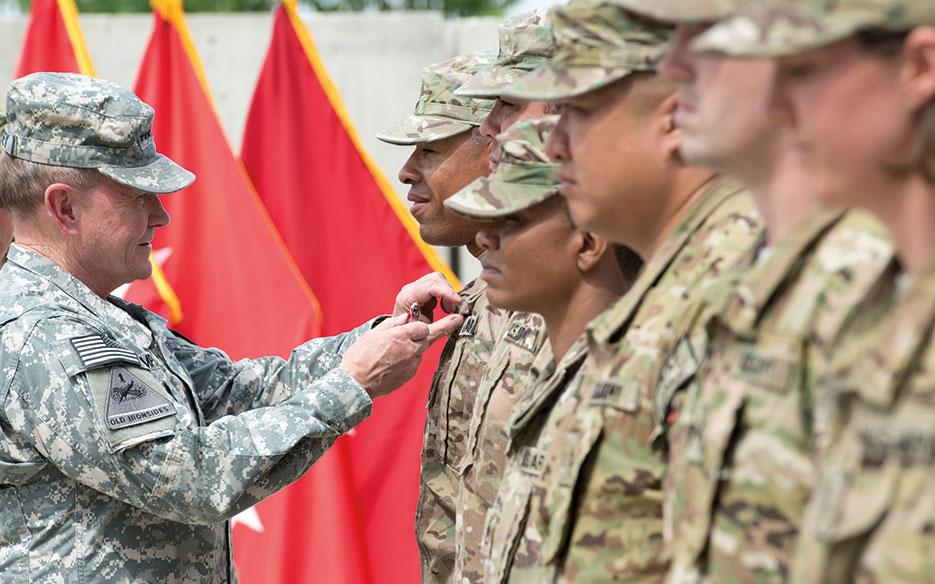Throughout over 40 years of service, I have maintained a list of principles to judge my actions against. Chief among these principles is duty. I have reflected and written on this topic throughout my career, and I strongly believe the concept of duty is central to the Profession of Arms. Indeed, it seems to me to be the cornerstone of the uncommon life to which we have dedicated ourselves.
Entrusted by society to apply violence on behalf of the Nation, we have a moral imperative to understand and uphold our solemnly sworn duty to “support and defend the Constitution.” It is worth a conversation about what duty entails.
Our duty as Servicemembers resides in two primary responsibilities. First, we keep the Nation free from coercion. Second, we support our elected leaders as they perform their constitutional duties. To fulfill these responsibilities requires continued and lifelong development of three important traits: expertise, humility, and courage.

President Obama talks with General Dempsey after attending Armed Forces farewell tribute for Secretary Leon Panetta at Joint Base Myer–Henderson Hall (White House/Pete Souza)
Expertise
Military leaders have a duty to understand the use—and the limitations—of the military instrument of power. We must be unrivaled experts in the application of force on behalf of the Nation.
At the tactical level, our teams and units require highly skilled leaders who accomplish their assigned missions with the greatest chance of success and minimal risk to the force. In this, we should always overmatch our adversary. To this end we must remain persistent students of the art and science of war, continually honing our skills as individuals, small teams, and units.
At the strategic level, civilian leaders depend on our advice and expertise to assist in the development of national strategies consistent with our long-term national objectives. Our role is to offer options in discussions regarding the best use of military forces. We provide the “how we” and “can we” for any given situation, but we are not ultimately responsible for the “should we.” That is, and always will be, a decision rightfully belonging to our elected leaders.
Our duty as military members is to accurately assess risks and present our best military advice with clarity and candor—whether planning a small unit–level attack or testifying about military posture before Congress. To fulfill these responsibilities, we must be trusted, and professional expertise is the necessary foundation of this trust.
Humility
Humility is the constant companion of expertise. Lifelong learning requires acknowledging gaps in our expertise, examining our successes and failures, and admitting both our strengths and weaknesses. This can be particularly challenging in a culture that prizes success and values immediately providing answers. Humility allows us to step back, set our ego aside, and embrace new ideas.
It takes humility to acknowledge that our civilian leaders do not have to accept our advice wholesale. Military leaders must have the humility to recognize that our senior leaders balance multiple competing demands. I can say with confidence that civilian leaders want to hear our advice. They know they owe it to the American people to consider all information and to weigh the risks before deciding on a particular course of action—and they take that obligation seriously.
For our part, we must recognize that the military is only one instrument in an array of national power. Frankly, it is often not the most important or appropriate instrument. In developing plans, policies, or budgets, there are always legitimate and competing considerations, and our civilian leaders are responsible to weigh and integrate these competing considerations. We must remember national security is but one aspect of a much larger set of choices.
Courage
Duty performed well requires courage. Certainly our line of work requires the physical courage to act in the face of grave bodily danger. Yet doing our duty also demands moral courage—that is, resolve in the face of ambiguity.
We intuitively understand acts of physical courage—honoring and rewarding those who display such acts. In praising these physical acts, we reinforce their importance to our concept of duty. It is not clear that we do the same to reinforce and cultivate moral courage. Duty may require us to advocate an unpopular position. It may require us to risk our personal ambitions. Duty may require the courage to act decisively or to show restraint.
In today’s environment of ubiquitous communication, there is an inexorable pull to blog, tweet, comment, and post. Such media can host laudable professional expression, but some may be seduced by reading their name in print or receiving recognition online. Tempting as it may be to enter the limelight, we should consider that courage may require us to remain quiet professionals.
In policy development, disagreement is not disloyalty. Debate is healthy when conducted with professionalism and in the proper forums. But it is inappropriate to become a salesman for policy or to circumvent proper channels for discussion.
In the end, courage demands that we remain objective, unemotional, and apolitical.

General Dempsey presents Soldier with Bronze Star Medal during visit to Bagram Air Base, Afghanistan (DOD/Daniel Hinton)
An Uncommon Life
Clearly, a life devoted to duty—and the foundational traits of expertise, humility, and courage—is an uncommon life. Yet as Saint Augustine reminds us, “In doing what we ought we deserve no praise, because it is our duty.”
Our commitment to a life of duty should give us no sense of superiority or entitlement but rather a deep sense of responsibility. Our duty as members of the military profession is an act of service best accomplished with a servant’s soul. We must remember our military does not exist for its own sake. It exists for the Nation it serves. JFQ
Martin E. Dempsey
General, U.S. Army
Chairman of the Joint Chiefs of Staff